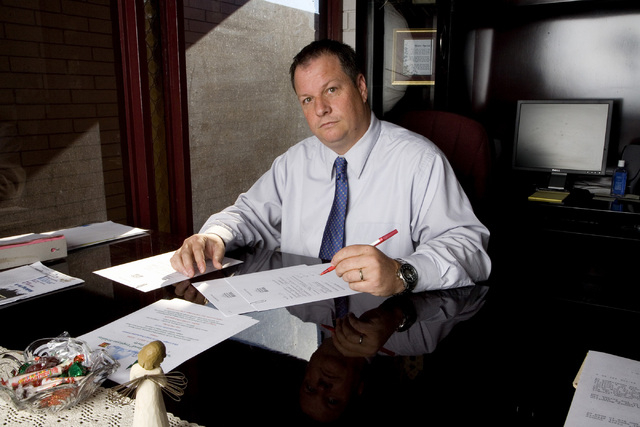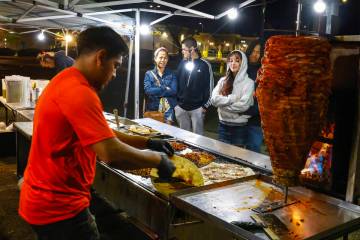Nevadan at Work: Exec helps struggling people to better help themselves
Kevin Morss got his executive job the old-fashioned way.
He started in an entry-level position and worked his way up to regional vice president.
But Morss doesn’t lead the Nevada division of a big corporation. He oversees state operations for WestCare, a nonprofit group that provides services for issues related to mental health, substance abuse, domestic violence, homelessness, HIV/AIDS and criminal justice. WestCare helps some of the city’s neediest — the poor, the uninsured and the underserved. It has programs for kids; veterans; families; and the LGBT community: lesbians, gays, bisexuals and transgender people.
WestCare is itself a local success story. The group launched in Las Vegas 40 years ago, and today provides outpatient and residential treatment through more than 100 locations in 15 states, including Arizona, California, Florida, Illinois, Texas, Wisconsin and Washington.
But nowhere has WestCare had a more daunting task than in Southern Nevada. The recession hit the region especially hard, and Morss said it hasn’t been easy keeping up with demand in a city of 2 million. WestCare served 10,000 locals in 2012.
Question: What made you decide to go into nonprofit management?
Answer: I was in the for-profit world in mental health and substance abuse, and people were being turned away from treatment because of insurance. When their insurance ran out, they were forced out. So I turned to the nonprofit world because ability to pay was never an issue. It was about what we could do to help clients meet their needs to become better or healthier people.
Question: Why did you want to work at WestCare?
Answer: My initial job was as a street-outreach worker, working with homeless kids. Growing up here in Las Vegas, I kind of hung out somewhat on the streets, so I saw a lot of people in need. It gave me the drive to help people who have slipped through the cracks.
Question: Have the issues WestCare sees among locals changed over the last decade?
Answer: In the economic downturn, we’re seeing a lot more individuals who, once a upon a time, were wealthy or had the money to go to a for-profit place. Now, they no longer can afford it, so we’re seeing a bit of different demographic coming in.
We’re also seeing a high number of young adults ages 18 to 24 with opiate (painkiller addiction) issues. They’re really from more affluent suburbs. One of the biggest things we’re seeing is prescription pain pills being over-prescribed. With suburban kids, a lot of parents have insurance, so they’re able to get prescriptions easily, and their kids are taking the prescriptions.
Question: What’s the biggest community crisis in Las Vegas today?
Answer: Mental health and substance abuse. It’s just such a big issue, and there are not enough resources for people. We’re kind of putting a Band-Aid on a major wound. The city doesn’t have enough beds. The access to psychotropic medication is difficult because it’s very expensive, and a lot of people don’t have insurance. They have to choose between continuing their medication or paying their rent.
Also, the wait list to see service providers is long. If somebody’s trying to get clean and sober, they usually have a clear moment, and they want to get services right then. But they might have to wait a week or two to see a counselor. It’s the same thing with mental health.
We have acute detox and mental-health issues. There are just one or two places in town where people can get in immediately, and the city has just 36 beds dedicated to people with substance abuse and co-occurring disorders. Nevada also has one of the country’s lowest ratios of psychiatrists to patients.
Question: What is WestCare doing to help?
Answer: WestCare’s always been a safety net for the uninsured. So we’ve looked at trying to expand community triage beds. We provide residential treatment for men and adolescent boys ages 13 to 17. We’re the only program in (Southern Nevada) that provides treatment for women and kids from birth to age 6. If mom has an issue, we try to keep the family together so they can go through treatment to stop the cycle. And we have a shelter for homeless kids ages 10 to 17. We also do a lot of crisis intervention, trying to solve problems before they become bigger. We go out on the streets and find people. We work with kids in schools in at-risk areas, or Boys &Girls Clubs, YMCAs and youth centers. If a child tells us they’re having a problem at home, we can step in and get it fixed before something happens.
Question: What’s the issue that you personally care about the most?
Answer: You’re not going to get rich in nonprofits, but the biggest reward is helping your neighbor become self-sufficient. Helping our neighbors get over substance-abuse issues or mental illness is really where I find my rewards. WestCare has allowed me to help my neighbor.
Question: What’s a typical day like for you?
Answer: I spend most of my days advocating for people who can’t advocate for themselves. A lot of people don’t really care about substance abuse or the homeless or mentally ill. They think, “As long as they’re not in my backyard or neighborhood, I don’t want to be bothered by it.”
So we go to corporations to ask for in-kind donations. Or I’ll meet with the Mental Health Coalition, where we all come together as providers to figure how we can add resources or make the best use of the resources we have. How do we provide better services for mental health? How do we add more beds? We look at those dollars, and we look at how to increase the scarce workforce in this occupation.
And anytime I get a chance to get in front of city, county and state officials, I’m there. Sometimes it’s about a new law: A few years back, we worked on helping people get services after they came out of prison. A lot of former prisoners have barriers such as not having IDs, so we worked with lawmakers to make sure prisoners can come out with IDs.
Question: What has been your biggest accomplishment?
Answer: Because I have such a heart for working with kids, it would be getting involved in fixing the state’s right-to-shelter law in 2004. A barrier for homeless kids was that they couldn’t access services like shelters, food pantries, mental health services or substance-abuse counseling because they needed parental permission. We changed that.
When I came to WestCare, I was working with homeless kids. I’ve always found that very rewarding. We work with kids from 10 to 17. It means a lot to me to get a 10-year-old back into services, and into a place where they’re safe instead of being on the street, where they’re preyed upon by sexual predators and drug dealers.
Question: What are your career goals?
Answer: The biggest thing for me is providing a better continuum of care for the mentally ill, the homeless and people with substance-abuse issues. How do we get individuals into housing? Sometimes it’s hard to find apartments that will take (rent) vouchers. But the housing-first model is what we do. Instead of putting someone in a shelter, we want to put them in a home and wrap our case-management services around them to prevent them from being homeless again.
Contact reporter Jennifer Robison at jrobison@reviewjournal.com. Follow @J_Robison1 on Twitter.





























